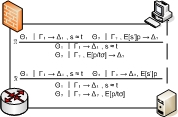
informatik
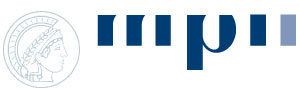


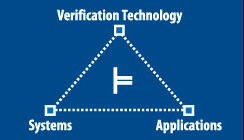
The summer school on verification technology, systems & applications takes place at the Max Planck Institute for Informatics at Saarbrücken, Germany from September 15th-19th. We believe that all three aspects verification technology, systems & applications strongly depend on each other and that progress in the area of formal analysis and verifiation can only be made if all three aspects are considered as a whole. Our five speakers Gilles Barthe, Clark Barrett, Martin Fraenzle, Radu Mateescu, and Grégoire Sutre stand for this view in that they represent and will present a particular verification technology and its implementation in a system in order to successfully apply the approach to real world verification problems.
The number of participants in the school is limited to 40. We expect participants to hold a bachelor (or higher) degree in computer science (or equivalent) and to have basic knowledge in propositional and first-order logic.
The summer school is free of charge. It includes the lectures, daily coffee breaks and lunches and the special summer school dinner on Wednesday. Participants take travel, accomodation and daily living costs on their own. Recommendations on hotels can be found below.
Please apply electronically by sending an email to Manuel Lamotte (lamotte (at) mpi-inf.mpg.de) including
until the 20th of July, 2008. Notifications on acceptance will be given by July, 31st.
The registration will be open to accepted applicants starting on August, 1st, 2008.
All lectures will take place in room 024 at the ground floor of the Max Planck Institute for Informatics (MPII, building E1 4) located on the university campus of Saarbrücken.
| September 15 Monday |
September 16 Tuesday |
September 17 Wednesday |
September 18 Thursday |
September 19 Friday |
|
|---|---|---|---|---|---|
| 9.00-12.30 | Radu Mateescu Slides |
Gilles Barthe Slides |
Martin Fränzle Slides |
Grégoire Sutre Static Analysis Slides |
Clark Barrett SMT: Theory and Practice Slides |
| 12.30-14.30 | Lunch break | ||||
| 14.30-18.30 | Gilles Barthe Slides |
Radu Mateescu Slides |
Clark Barrett SAT: Theory and Practice Slides |
Martin Fränzle Slides |
Grégoire Sutre Abstraction Refinement Slides |
| Evening | School Dinner | ||||
Clark Barrett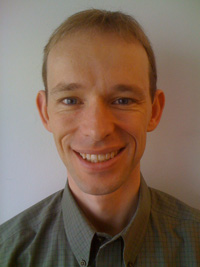
|
SAT and SMT: Theory and Practice While Boolean methods are capable of modeling most verification tasks, systems are usually designed and modeled at a higher level, and the translation to Boolean logic can be both expensive and obfuscating. Satisfiability Modulo Theories (SMT) is the natural next step in the evolution of fast and automatic verification engines. Built on top of fast SAT solvers, SMT solvers can match the speed and automation of today's Boolean engines while at the same time providing high-level reasoning capabilities that give them a significant advantage in both ease of use and performance. In these lectures, I will present a theoretical framework for SAT and SMT, discuss the history and content of the main innovations that have led to important performance improvements, and give some perspective on how to build and use SAT and SMT solvers. |
|
Gilles Barthe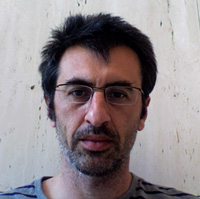
|
Formal Methods for Software Correctness and Security |
|
Martin Fränzle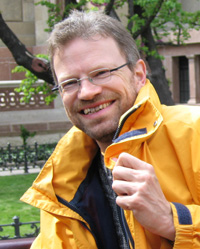
|
Automatic Analysis of Hybrid Systems Within this school, we concentrate on automatic verification and analysis of hybrid systems, with a focus on fully symbolic methods manipulating both the discrete and the continuous state components symbolically by means of predicates. We provide an introduction to hybrid discrete-continuous systems, demonstrate the use of predicative encodings for compactly encoding operational high-level models, and continue to a number of methods for automatically analyzing safety, stability, and progress. |
|
Radu Mateescu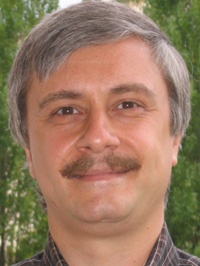
|
Model Checking of Action-Based Concurrent Systems We give an overview of these formalisms and show how they can be used to specify the behaviour of various asynchronous systems. We also present the main verification methods operating on LTSs, namely equivalence checking and model checking, and we illustrate their practical implementation and usage by means of CADP, a state-of-the-art verification toolbox for asynchronous systems. |
|
Grégoire Sutre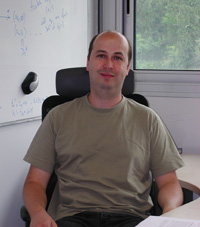
|
Software Model Checking Approximate verification techniques can be used to verify large systems that are beyond the reach of classical model checking. These techniques are based on property-preserving abstractions of the semantics of the system. Abstractions were first designed manually, but automatic techniques such as predicate abstraction and CEGAR (counter-example guided abstraction refinement) have recently led to fully automatic and successful tools for the verification of large software systems. In these lectures, I will present the two main theoretical frameworks for software verification by abstraction: abstract interpretation and abstract model refinement. Algorithms to automatically construct abstract models from program sources will be presented, as well as an overview of several refinement methods. Several variants of the CEGAR approach will be compared. I will also discuss symbolic verification of some classes of infinite-state abstract models that arise from software constructs such as recursion or thread creation. |
The participants are responsible for their room reservations. In Saarbrücken per-night prices including taxes and breakfast typically range from EURO 20 (youth hostel, double room) to about EUR 70 (hotel, single room).
Here is a list of hotels as provided by the Kongress and Touristik GmbH, Saarbrücken.
We have also reserved rooms at a special rate in the following hotels. Please book the rooms yourself using the keyword "Summer School".
The Summer School 2008 will take place at the campus of Saarland University, in the building of the Max Planck Institute for Informatics (MPII, building E1 4) located on the university campus. For more information on Saarbrücken, you can also check here.
General instructions: Directions
Please use the connection planning tool offered by the public transportation in Saarland:
Please use the multi-storey car park "Uni-Ost". Pull a parking ticket. On departure you will get a free ticket for leaving the car park.
General OrganizationLocal OrganizationFor comments or questions send an email to Roxane Wetzel (wetzel (at) mpi-inf.mpg.de). |
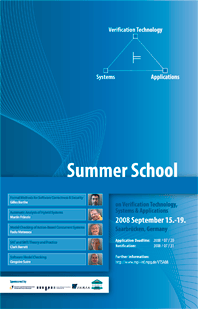 |
Photos of the event can be found here.